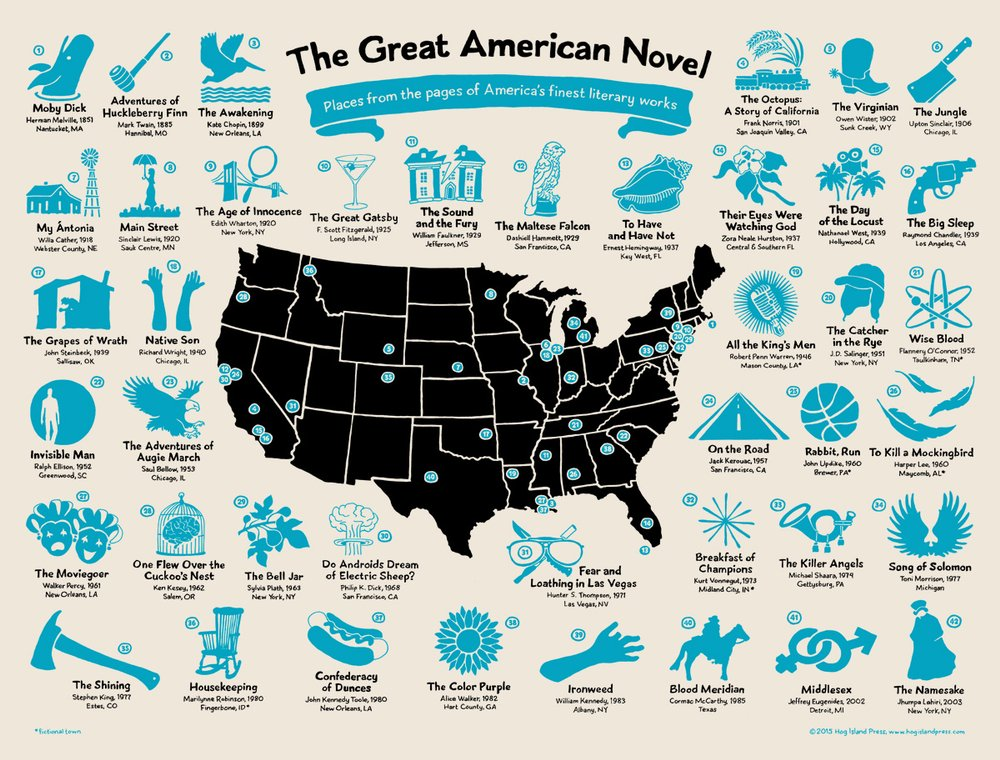Left-click: rotate, Mouse-wheel/middle-click: zoom, Right-click: pan, Escape: close
Rough idea of The Great American Novel:
-
'Shadow history of American society', 'like a fossil record'
-
Traumatic, terrifying history
- Continuously discussed by contemporaries
- People are still defending slavery as beneficial to African Americans.
-
Usually, from each of American literature's periods, one author attempts to create 'The Great American Novel'.
-
Race, gender, sexuality, domesticity, democracy, citizenship, immigration, labor, capitalism, and war.
-
Capturing the zeitgeist of America
Definitions!
- Coined by John William DeForest (1868)
- "The picture of the ordinary emotions and manners of American existence"
- e.g. Great Gatsby isn't a Great American Novel because Gatsby's perspective is not ordinary.

The Dream of the Great American Novel
- Text by Lawrence Buell
- Believed that Great American Novel is one that is encapsulating the American Dream, i.e. financial stability(not necessary wealth)
- Diverse cast of characters, "imagined as social microcosms or vanguards", placed in events and crises that serve to "constitute an image of 'democratic' promise or dysfunction"
- The rift within the American nation between groups/individuals, binary opposition
"One of the unspoken silences of the Great American Novel is the assumption that it can only be written by white men."
Generally, a Great American Novel is distinguished by the following features:
- Reflection of American Life and Culture: The novel should capture the essence of American society, exploring its values, conflicts, and dynamics. It often addresses themes such as the American Dream, freedom, identity, and social justice.
- Timelessness and Universal Appeal: Despite being deeply rooted in American context, the novel's themes and messages should resonate with readers across different times and places. It should offer insights into the human conditions that transcend its immediate setting.
- Exploration of Complex Themes: The novel typically delves into significant and multifaceted issues such as race, class, gender and morality. It should provoke thought and offer nuanced perspectives on these topics.
- Literary Excellence: High-quality writing, innovative narrative techniques, and well-developed characters are essential. The novel should be recognised for its artistic and intellectual achievements.
- Historical and Social relevance: Often, a Great American Novel provides commentary on significant historical events or periods, offering a window into the experiences and challenges of its time. It should contribute to the cultural and historical dialogue of the nation.
- Impact and Influence: The novel should have a lasting impact on readers and the literary landscape. It often becomes a part of the broader cultural conversation and influences other works of literature and thought.
- Narrative Scope and Ambition: While not a strict requirement, many Great American Novels have a broad and ambitious scope, attempting to encompass a wide array of experiences and perspectives within American life.
- Steinbeck captures people as they are, as he spends a lot of time studying, working alongside the subjects of his work.
- Charles Dickens was considered a great author at the time, but now we do, so perhaps famous authors now (Stephen King) may be considered writers of Great American Novels in the future.
- Migrant experience - universal appeal, historical context.
- Not migration in the usual sense, it is all domestic (Oklahoma to California)
- Grapes of Wrath has definitely had an impact on American culture - it was referenced in the Simpsons!!!
"Today marks the 69th anniversary of Steinbeck's The Grapes of Wrath, which for my dime is the 20th century's 'Great American Novel'. Personally, I like Gatsby and For Whom the Bell Tolls better, but Gatsby is somewhat of an unbelievable character (he's not the type of guy you're ever likely to meet) and the Hemingway isn't set in the U.S. Grapes is a distinctly American book relating a dark chapter in our history, and Tom Joad and Ma Joad, the all-time great mother character, are people you might meet. Steinbeck capture the American nature of the real people, the hard-working, regular guys 'just trying to get along without shoving anybody' as Tom says that Scott and Ernesto never did." - Michael Rogers, Literary Journal, 2008
American road novel
"There is a spirit, a feeling that resides along this highway. The spirit of Route 66 lives in the people and their stories, the views and buildings, and travelers' perceptions of the highway."
The American road novel is a literary genre that focuses o nthe theme of travel, usually involving a journey across the United States by car or other means of transportation. These novels often explore the landscape, culture, and social issues of America, emphasising the sense of freedom, adventure, and self-discover that comes with hitting the open road. Key characteristics oft he American road include:
- Journey and Exploration: Central to the narrative is a physical journey, often spanning long distances. This journey is usually undertaken for various reasons, such as seeking adventure, escaping from something, or searching for meaning and identity.
- Freedom and Escape: The road often symbolises freedom from societal constraints and the opportunity to reinvent oneself. Characters are usually driven by a desire to break away from the routine or oppressive aspects of their lives.
- Self-Discovery: The protagonist often undergo personal growth and transformation. The experiences and people they encounter on the road contribute to their understanding of themselves and the world around them.
- American Landscape and Culture: The novel typically provides a vivid portrayal of the American landscape, from cities to rural areas, highlighting the diversity and complexity of the country. It also delves into various cultural, social and political issues prevalent in American society.
- Sense of Adventure: The narrative often involves a sense of adventure and unpredictability. The open road presents both opportunities and challenges, creating a dynamic and engaging story.
- Not really much of an 'adventure' in Grapes of Wrath, however they do face challenges.
- Escape from capitalism? Bank-owned land?
- Is Tom Joad experiencing some sort of self-discovery?
